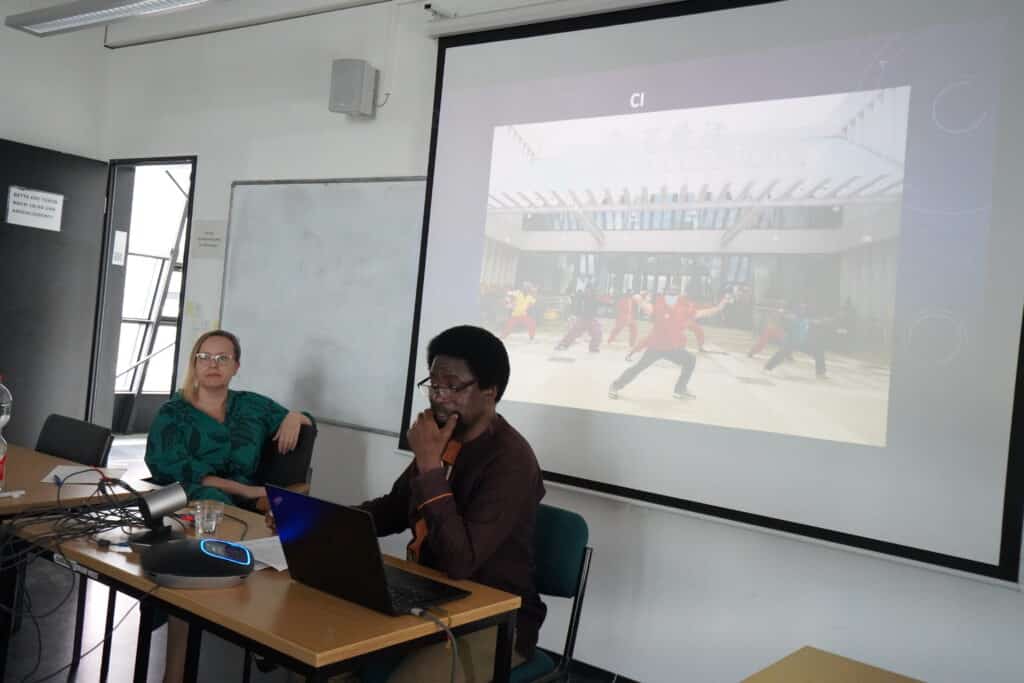Two Confucius Institutes exist in Tanzania. Their construction was financed by China and they are hosted by the University of Dar es Salaam and the University of Dodoma. The Tanzanian Director of the Confucius Institute at the University of Dar es Salaam (UDSM), Prof. Dr. Aldin Mutembei is a Fellow of our De:Link//Re:Link research project. Prof. Mutembei gave a very insightful public lecture at the Institute for Asian and African Studies here at the Humboldt Universität zu Berlin. His lecture was titled Confucius Institutes and Linguistic Neutrality. It was hosted within the Silk Road Talks Series within our De:Link//Re:Link research project and Prof. Dr. Susanne Gehrmann moderated the hybrid event with online participation of listeners from across the world including the key researcher on Confucius Institutes within our research project, Daniel Koßmann who is currently conducting field research in Dar es Salaam, Tanzania. Kiswahili is the main lingua franca spoken by Tanzania’s population of approximately 64.8 million. About 125 other languages are spoken in Tanzania. The Confucius Institute at the University of Dar es Salaam was established in 2013. Its partner institution in China is the Zhejiang Normal University. Prof. Mutembei commenced his lecture by noting that the Confucius Institute at the University of Dar es Salaam is not similar to Confucius Institutes that are located across Africa because it has gradually embraced localization of its activities. Even though Prof. Mutembei gives credit to the Senate of the University of Dar es Salaam, he has personally been at the forefront of shaping this localization not only in Tanzania but across Africa. Upon becoming the director of the Confucius Institute in Dar es Salaam, Prof. Mutembei insisted that the name placed outside the building that hosts the institute be written in Kiswahili and not English. Hence it is referred to as “Taasisi ya Confucius” and not “Confucius Institute” as is the case in many such institutes across Africa. ‘Taasisi’ is the Kiswahili translation for ‘institute.’ The University of Dar es Salaam successfully negotiated a policy that introduced the employment of qualified Tanzanian teachers who now teach Mandarin alongside teachers from China. Furthermore, Prof. Mutembei proposes that the Confucius Institute at University of Dar es Salaam should use locally developed learning materials for the teaching of Mandarin. Until now, Tanzania’s Ministry of Education receives learning materials that are donated from China and they are in English. During his public lecture in Berlin, Prof. Mutembei argued that teaching Mandarin using Kiswahili is the way forward instead of teaching Mandarin using English. “Use local languages! This has been my fight” he said. Currently, learning materials in Kiswahili-Mandarin are being produced. According to him, Mandarin language has been using the English culture to communicate to the Kiswahili culture. Prof. Mutembei posed myriads of critical rhetoric questions: “why does Beijing want to see Africa through London?” “Why do you want to see us the way the English are seeing us?” He further commented that “You don’t have to use the mountains and rivers from China to teach Chinese characters of mountains and rivers. Use those rivers and mountains that are familiar with the students.” According to Prof. Mutembei, “in that way, the students own the language” and “language learning becomes connected to the students”.

Prof. Mutembei noted that “any language is a repository of people’s values, knowledge, philosophy, innovations etc.” Hence, he argued that “Mandarin is not neutral and cannot be neutral.” According to Prof. Mutembei, Confucius Institutes are an instrument of soft power for China in the same way that Goethe Institute is for Germany, Alliance Francaise is for France and British Council is for United Kingdom. While quoting studies by Karugia (2016) and Monson (2009), Prof. Mutembei reflected upon the construction of the Tanzania-Zambia Railway (TAZARA). According to him, TAZARA “elevated China to the world stage” through China’s shrewd strategy of “the poor helping the poor”. Prof. Mutembei argued that the Confucius Institute in Dar es Salaam has embraced a win-win philosophy of mutual benefit for Tanzania and China through: embracing local Tanzanian teachers of Mandarin who are financed from China and accessibility of Mandarin to a wider audience through attachment of Confucius Institutes to Tanzanian universities as hosting institutions. The Confucius Institute in Dar es Salaam is not just a language learning center. It is involved in various activities. According to Prof. Mutembei, the Confucius Institute at UDSM approached Tanzania’s Ministry of Education and requested to establish two pilot projects on the teaching of Mandarin in Tanzanian schools. After the Ministry of Education approved the plan, two pilot projects were established in a primary school next to the University of Dar es Salaam and in another primary school located 565 kilometers away in Mtwara. The Confucius Institute in Dar es Salaam also organized an outreach program for farmers in 2018 in Dakawa, close to Morogoro, where farmers underwent an advanced agricultural training course on optimal farming techniques for rice, cucumbers and potatoes. As Confucius Institute was representing the University of Dar es Salaam, this was a further win-win according to Prof. Mutembei as the farmers receive education through Chinese projects of soft power. Beyond Tanzania, Prof. Mutembei is involved in scholarship and policy discussions to promote appreciation for African languages. He noted that “we wrote a proposal where we will no longer be using non-African languages to teach African languages. In Zimbabwe a pilot program of through which Kiswahili is being taught using Shona is underway; in South Africa Kiswahili is being taught using Isizulu” he said. Since “languages cross-pollinate”, Kiswahili, which is an African language, is not seen as a threat. Challenged on whether Mandarin might replace English and French as hegemonic colonialist languages, Prof. Mutembei said “I would not see Mandarin as colonialist as it gives people the opportunity to conduct business unlike Europeans who forced people to drop their languages.” In the US, very many Confucius Institutes have been shut down due to myriads of reasons. Prof. Dr. Kai Kresse appreciated Prof. Dr. Mutembei’s lecture and requested him to publish a paper out of it. For me, Prof. Mutembei’s lecture was an enrichment since I have been following Tanzania-China relations for the past 16 years after researching intensively in Tanzania for my doctoral dissertation on the political economy of Chinese migration to Tanzania in a transnational and translocal perspective. Listening to and dialoguing with Prof. Mutembei during and after his public lecture was an absolute delight.
Cited works:
Karugia, John Njenga (2016): Chinese Migration to Tanzania: The Political Economy of Chinese Migration to Tanzania in a Transnational and Translocal Context, Mkuki na Nyota Publishers, Dar es Salaam.
Monson, Jamie (2009): Africa’s Freedom Railway: How a Chinese Development Project Changed Lives and Livelihoods in Tanzania, Indiana University Press, USA.
